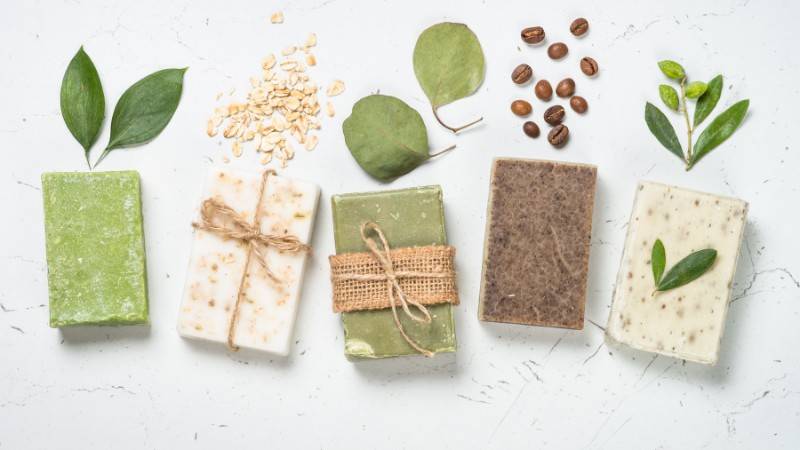Ever wondered why your skin feels dry or irritated after a shower? It might not be the water—it could be your soap. Many traditional soap bars contain synthetic fragrances, harsh detergents, and preservatives that can strip away natural oils and expose your skin to hidden toxins.
The good news? Natural soap bars offer a safer, skin-friendly alternative without the unnecessary chemicals. Made with plant-based oils, essential oils, and nourishing ingredients, they cleanse without compromising your skin’s health.
But are all soaps labeled “natural” actually good for you? What harmful chemicals should you avoid? And if you love a DIY approach, how can you craft your own soap at home?
Let’s explore the world of natural soap bars—why they matter, what to look for, and which eco-friendly brands are leading the way.
Are Traditional Soap Bars Toxic?
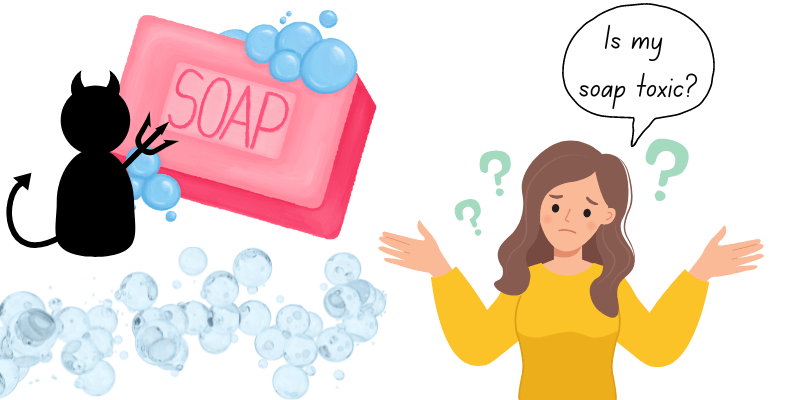
Traditional soap bars are mostly made of inexpensive oils, including animal fats like lard and tallow, and lately more often vegetable oils.
Then comes lye as the second most important ingredient. The reaction between lye and oil produces soap in the process known as saponification. The third component is water, which is added according to the specific recipe. Water helps lye and oil molecules stick together.
These are the most basic ingredients found in bar soap. So far nothing harmful about those.
Traditional soap in its purest form is pretty much harmless!
However, manufacturers often add other ingredients (!) like colors, preservatives, essential oils, scents, and fragrances.
Bad for the Environment
The problem is that fragrances and coloring may be achieved by synthetic chemicals that can disrupt aquatic ecosystems through eutrophication. This is a process when a body of water becomes too rich in nutrients which causes harmful algae blooms that deplete oxygen from water.
If you’ve ever gone camping near a body of water, you must have seen the signs urging campers not to use soap in a lake, river, pond, etc. The same applies to pouring soapy water into natural bodies of water.
The detergent in soap breaks the surface tension of the water, which is essential for many water-striding insects to get around.
Lower surface tension also reduces the oxygen in the water, which causes harm to fish and other aquatic life.
Bad for You
Along with these synthetic fragrance and coloring ingredients, traditional soap can also contain parabens, sodium laureth sulfate, triclosan, and other questionable ingredients.
These compounds are known as carcinogens and endocrine disruptors. This makes them far from ideal ingredients to cleanse your skin with.
Did you ever notice how your skin becomes dry after using a traditional soap? Instead of cleaning and moisturizing it, traditional soap can actually dry out your skin and cause allergic rashes.
Organic soap bars, on the other hand, are made with natural ingredients that come from organic farming practices, making them more nourishing to your skin and safer for the environment.
But before we get to non-toxic soap, let’s first see what we are up against.
What Harmful Chemicals Are In Our Soaps?
1. Cocamidopropyl Betaine
This synthetic detergent and surfactant (improvers spreading and wetting) is used to increase foaming in cleaning products. As a synthetic surfactant, cocamidopropyl betaine is often found in personal hygiene products including hand soaps.
However, cocamidopropyl betaine can cause allergic skin reactions and contact dermatitis, while being toxic to the environment.
The American Contact Dermatitis Society named it Allergen of the Year 2004. Cocamidopropyl betaine can appear under different names, so to be sure look for products that don’t contain:
- CADG
- Cocamidopropyl betaine
- Cocamidopropyl dimethyl glycine
- Cocoamphocarboxypropionate
- Cocoamphodipropionate
- Disodium cocoamphodipropionate
2. Formaldehyde
Formaldehyde is a commonly used preservative in beauty products, but also a known carcinogen that is related to asthma, neurotoxicity, and developmental toxicity.
So how can you avoid it? Avoid products with these labels:
- Quaternium-15
- DMDM hydantoin
- Imidazolidinyl urea
- Diazolidinyl urea
- Sodium hydroxymethylglycinate
- 2-Bromo-2-nitropropane-1,3 diol
3. Fragrances
I hate to break it to you, but that charming lavender and white florals in your soap most certainly don’t come from natural essential oils. The problem is that the fragrance industry is not required to disclose the ingredients used in their products.
This means there can be hundreds of ingredients in one fragrance.
So where do the problems start?
Our skin absorbs fragrances into the bloodstream where they pose health risks, including endocrine disruption, organic toxicity, allergies, neurotoxicity, asthma, and cancer.
Fragrances also may contain phthalates that normally aren’t listed on the labels, which can lead to hormone disruption, birth defects, and developmental toxicity.
Fragrances don’t make your hand soap any more efficient and may induce some serious health risks, so you better avoid them altogether.
4. Parabens
Parabens are preservatives used in a variety of personal care products including hand soaps. However, their chemical composition mimics the behavior of estrogen in the body and is linked to endocrine disruption, cancer, and developmental toxicity. Avoid parabens by avoiding hand soap that has ingredients ending in -paraben.
5. Sodium Laureth Sulfate (SLES) and Sodium Lauryl Sulfate (SLS)
SLES and SLS are surfactants that cause skin irritation and trigger allergies. SLES often contains traces of 1,4-dioxane, a byproduct of a petrochemical process and a known carcinogen. As for SLS, the health concerns include irritation to the eyes, lungs, and skin. When inhaled, this ingredient causes coughing and sore throat.
6. Triclosan
Used as an antibacterial agent in hand soaps. The good news is that the FDA finally banned this chemical in September 2016 and gave manufacturers 1 year to pull their products using the chemical from the market or find a way to reformulate it.
This means you probably won’t have to worry about it. However if it’s still not banned where you live, it’s best to avoid triclosan because it tends to accumulate over time in the body and cause hormonal imbalances and organ system toxicity.
What Makes Natural Soap Bars Good?
Natural soap bars come with a variety of benefits for both our skin and the environment. Just take a look at what you’re missing out.
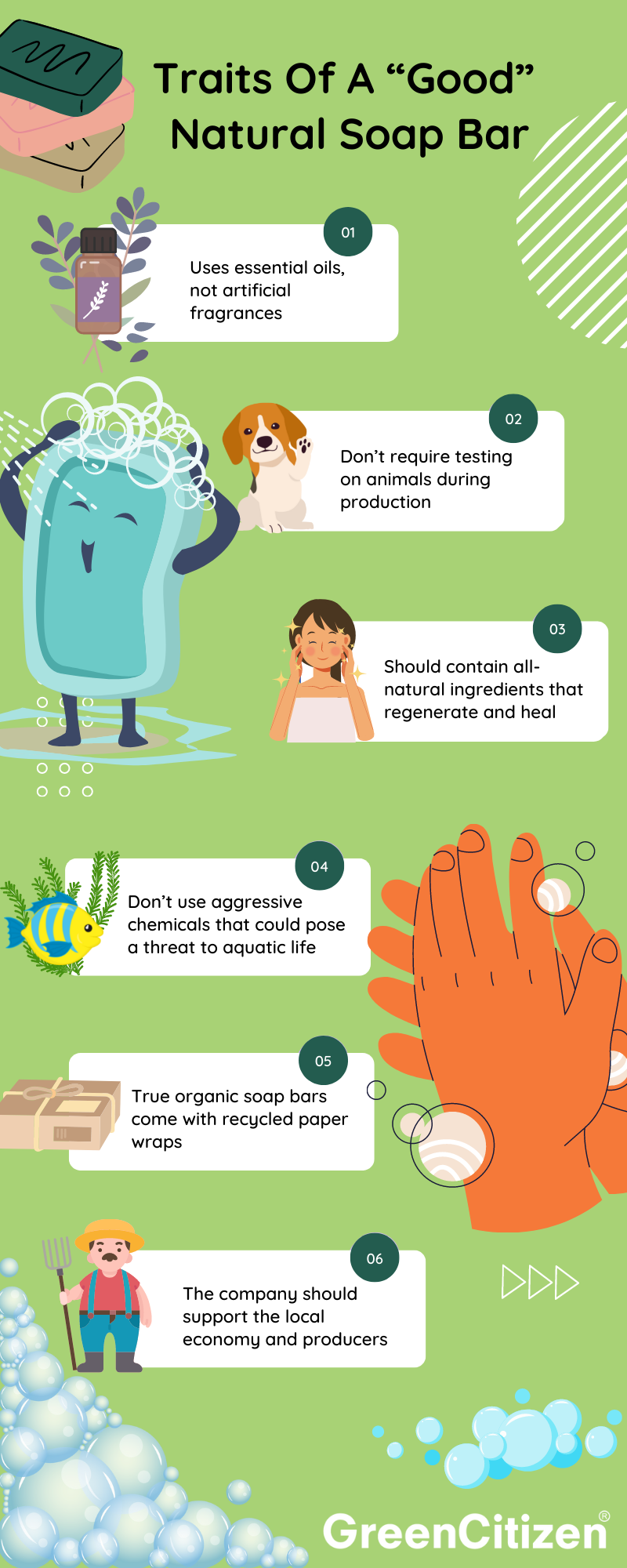
No Chemicals
In most cases, commercial soap bars use various toxic and harmful chemicals like phthalates, phosphorus, petrochemicals, triclosan, and many more. These ingredients are extremely bad for the skin and the environment. Natural soap bars don’t use harmful chemicals and synthetic ingredients. Thus, it’s more soothing for the skin.
Essential Oil Fragrances
Organic soaps use essential oil fragrances like lavender, lemongrass, or peppermint which not only add a pleasant scent but also give the soap antibacterial properties. Now compare this with regular soaps that often come with artificial fragrances that contain ingredients that are associated with hormonal imbalance, reproductive issues, and even cancer.
Cruelty-Free
Organic soaps are animal-friendly because they don’t require testing on animals during production. Why? Because they don’t contain any toxic chemicals so there’s no need to test their safety. Natural soap bars are made with plant-based oils and if they contain lard, honest manufacturers make sure that’s visible on the label.
Nourish the Skin
Organic soaps are made from essential oils, spices, and herbs. These are all-natural ingredients chosen for their regenerative and healing properties. Since they don’t contain harsh chemicals, organic soap bars can even help with skin conditions like acne, eczema, and sunburn.
Biodegradable
Natural soap bars don’t use aggressive chemicals that could pose a threat to aquatic life. Besides, no pesticides were used during their production. However, mind that even biodegradable soap is still soap, so you should never use it or dispose of it near natural bodies of water. It has to go into the ground.
The safe way to use it outdoors is to fill a bucket with water and soap up and bathe at least 200 feet away from any lake or stream. When you’re done, dig a hole about 9 inches deep and dispose of soapy water. This will allow bacteria in the solid to biodegrade the soap.
Sustainable Packaging
The convenience and rich foam has driven many people away from soap bars to use bottled products. However, paper wraps are 100% recyclable and the recycling process itself is less energy-demanding. True organic soap bars come with recycled paper wraps that are compostable and recyclable.
Support Small Businesses
What is the best place to shop for soap bars made with organic ingredients? Local farmer’s markets and craft fairs. As more people become aware of the environmental hazards of industrial soaps, the cottage industry of homemade organic soaps is gaining traction. We can support those green-minded entrepreneurs by choosing their products over artificial soaps.
5 Ethical Natural Soap Bar Brands Leading the Revolution
Switching to natural soap bars isn’t just about better skincare—it’s also about supporting brands that prioritize sustainability, ethical sourcing, and eco-friendly manufacturing.
While many companies claim to be “natural,” only a few truly walk the talk.
These brands go beyond making soap; they ensure their ingredients, packaging, and production align with environmental and ethical standards.
Crate 61: Vegan, Zero-Waste, and Handmade
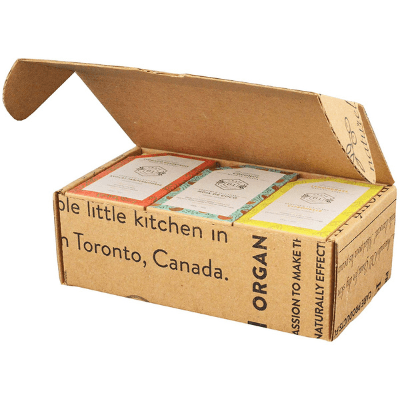
Crate 61 has built its reputation on crafting vegan, cruelty-free, and zero-waste soap bars.
Each batch is cold-pressed using premium plant-based oils like extra virgin olive oil and unrefined avocado oil, ensuring a deep cleanse without drying the skin. Their commitment to sustainability is evident in their biodegradable paperboard packaging—an eco-friendly alternative to plastic-wrapped soaps.
Whether you love the refreshing scent of eucalyptus mint or the soothing properties of lavender, Crate 61 ensures that your soap is as good for the planet as it is for your skin.
Beekman 1802: The Science of Goat Milk Skincare
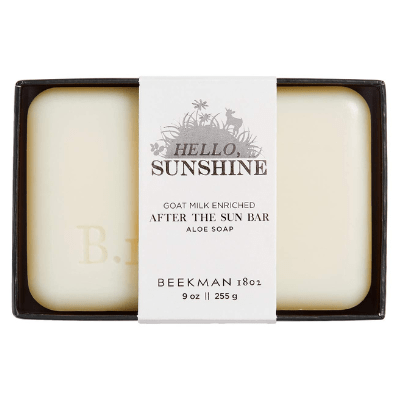
Beekman 1802 takes a farm-to-skin approach, crafting its soap with goat milk sourced from small, family-owned farms.
Unlike many conventional brands that strip away natural moisture with harsh chemicals, Beekman 1802 embraces the nourishing properties of lactic acid and natural exfoliants. This pH-balanced soap is wrapped in recyclable packaging, with transparency in ingredient sourcing.
Plus, the Leaping Bunny certification ensures that no animals were harmed during production.
Dr. Bronner’s: The Pioneer of Organic & Multi-Purpose Soaps
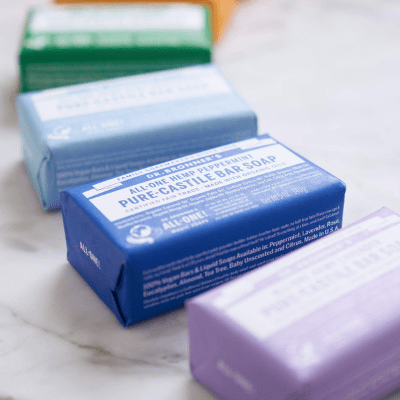
Few brands match the legacy of Dr. Bronner’s when it comes to ethical business practices.
A certified B Corp, Dr. Bronner’s ensures that every ingredient—from organic coconut oil to essential oils—is fair trade and cruelty-free. Their commitment extends beyond skincare: their biodegradable, vegan formula makes their soap safe for the environment and versatile enough for dishes, laundry, and even pets.
Their mission-driven model prioritizes regenerative agriculture and social justice, making them a leader in sustainable soap manufacturing.
Bali Soap: Handcrafted Luxury with Botanical Exfoliants
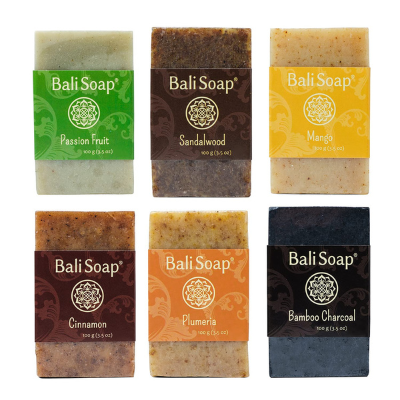
Rooted in Indonesian tradition, Bali Soap focuses on handcrafting soaps using natural glycerin derived from exotic botanicals.
Their small-batch production ensures high-quality standards while minimizing environmental impact. Each bar is wrapped in recyclable paper and infused with tropical ingredients like cinnamon, sandalwood, and bamboo charcoal.
This brand celebrates the rich biodiversity of the Indonesian archipelago while maintaining a plastic-free, eco-conscious approach to skincare.
Australian Botanical Soap: Supporting Ethical Farming & Sustainable Sourcing
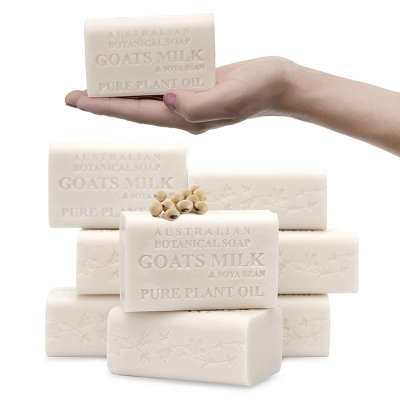
Proudly Australian-made and owned, Australian Botanical Soap stands out for its sustainable palm oil use and commitment to chemical-free formulas.
Their soap bars, enriched with organic shea butter and goat milk, cater to sensitive skin while supporting ethically sourced plant oils. Unlike mass-market brands that rely on synthetic detergents, this company refuses to use SLS, HEDP, EDTA, or other harsh chemicals.
Even their goat milk comes from free-ranging goats in South Eastern Victoria, ensuring humane and sustainable farming practices.
How to Make DIY Soap Bars at Home
Making DIY soap is a fun pastime that some people have turned into a small business!
When I started making soap at home I quickly realized I can put whatever I want in there and still it’ll be safe for my family. Being able to play with different ingredients is actually my favorite part of making soap. You can change the scent by adding different combinations of essential oils.
For now, let’s make basic cold process soap. For this recipe, I’ll be using
- Olive oil
- Coconut oil
- Sodium hydroxide (lye)
- Distilled water
- Essential oil of choice
These oils are all nourishing to your skin and all-natural.
Note: Always wear long sleeves, gloves, and safety goggles when working with lye.
Step 1
In four separate dishes measure:
- 473 grams of lye
- 3 lbs of distilled water
- 4 lbs of olive oil
- 4 lbs of coconut oil
I’m purposely not using palm oil. Each year, palm oil plantations destroy millions of acres of forested land, creating billions of tons of carbon pollution and killing endangered wildlife. This makes the palm oil industry one of the worst environmental offenders on the planet.
Palm oil is one of the top 3 causes of deforestation in Indonesia, a country that supplies more than half of global demand.
So I’m doing my part by not choosing products containing palm oil or making sure that it’s harvested and produced sustainably.
Step 2
Carefully add lye to distilled water. It’s safer to do it outside because lye fumes are caustic…like chopping the onions but 10 times worse.
LOL.
Let the mixture cool to 80 °F (27 °C).
Step 3
Set the heat to low and heat the olive oil and coconut oil to 80 °F.
Step 4
Gently pour the water-lye mixture into the mixture of oils and stir carefully until the “trace” forms.
Step 5
Add essential oils of your choice.
Step 6
Pour into the plastic mold. I prefer those with removable plastic dividers, so I don’t have to cut the bars once they are set. All I do is remove the dividers and trim the bars, or use them as-is.
Cover the mold and leave it undisturbed for 24 hours. Remove the bars and leave them on cardboard to cure for at least 30 days before use.

Read More:
Final Thoughts
Traditional soaps are still made with harsh antibacterial chemicals and synthetic fragrances that not only cause allergies but are also associated with hormonal disruptions and even cancer.
As a much safer alternative, I can sincerely recommend each of these 10 great natural soap bars. If you like DIY projects, you can make eco-friendly soap at home as well.
Whichever way you prefer, soap bars made with natural ingredients are much healthier for your skin and much safer for the environment.

